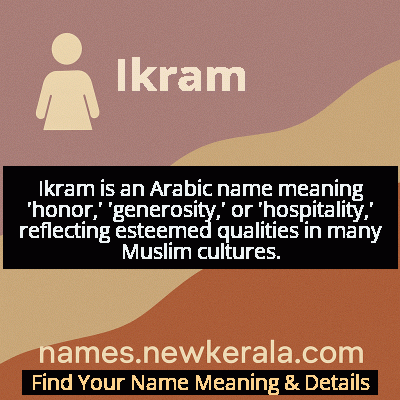Ikram Name Meaning & Details
Origin, Popularity, Numerology Analysis & Name Meaning of Ikram
Discover the origin, meaning, and cultural significance of the name IKRAM. Delve into its historical roots and explore the lasting impact it has had on communities and traditions.
Name
Ikram
Gender
Female
Origin
Muslim
Lucky Number
7
Meaning of the Name - Ikram
Ikram is an Arabic name meaning 'honor,' 'generosity,' or 'hospitality,' reflecting esteemed qualities in many Muslim cultures.
Ikram - Complete Numerology Analysis
Your Numerology Number
Based on Pythagorean Numerology System
Ruling Planet
Neptune (Ketu)
Positive Nature
Intuitive, analytical, spiritual, and inquisitive.
Negative Traits
Secretive, reserved, aloof, and can be overly critical.
Lucky Colours
Green, yellow.
Lucky Days
Monday.
Lucky Stones
Cat’s eye, moonstone.
Harmony Numbers
1, 5, 6.
Best Suited Professions
Scientists, researchers, spiritual leaders, detectives.
What People Like About You
Depth of knowledge, analytical skills, spirituality.
Famous People Named Ikram
Ikram Abdi Omar
Politician and activist
Pioneering women's rights work in Somali politics
Ikram Al-Masabi
Journalist
Award-winning humanitarian reporting in conflict zones
Ikram Ullah Khan
Educator
Established girls' education networks in rural Pakistan
Ikram Cakir
Fashion designer
International recognition for Ottoman-inspired modern fashion
Name Variations & International Equivalents
Click on blue names to explore their detailed meanings. Gray names with will be available soon.
Cultural & Historical Significance
In contemporary Muslim societies, Ikram continues to represent idealized feminine virtues that combine strength with compassion, dignity with approachability. The name is often chosen by parents who wish to instill values of social responsibility and ethical leadership in their daughters. During important Islamic holidays like Eid, the principles embodied by the name Ikram—generosity, hospitality, and honoring guests—become central to community celebrations. The name also reflects the Islamic teaching that true honor comes from serving others rather than seeking status, making it a name that carries both cultural depth and spiritual significance across diverse Muslim communities worldwide.
Extended Personality Analysis
Women named Ikram typically exhibit a distinctive blend of traditional warmth and contemporary strength that makes them natural community leaders and trusted advisors. Their personality is often characterized by an innate sense of dignity that doesn't alienate others but rather makes people feel respected in their presence. Ikrams tend to be excellent judges of character, able to see the inherent worth in people regardless of their social standing. They usually possess remarkable emotional intelligence, allowing them to navigate complex social situations with grace and wisdom.
In professional and personal settings, Ikrams often become the glue that holds groups together, using their natural hospitality to create inclusive environments where everyone feels valued. They typically demonstrate resilience in adversity, drawing strength from their core values rather than external validation. Many develop reputations as generous mentors who uplift others without seeking recognition. Their generosity often manifests in creative ways—whether through sharing knowledge, providing emotional support, or creating opportunities for others. While they can be traditional in their values, they're often surprisingly progressive in their thinking, able to honor heritage while embracing positive change.
Modern Usage & Popularity
In the 21st century, Ikram maintains its cultural relevance while adapting to contemporary naming trends. The name enjoys steady popularity in Middle Eastern countries like Saudi Arabia, UAE, and Jordan, where it ranks consistently among preferred names for girls. Among diaspora Muslim communities in Europe and North America, Ikram has gained appeal as parents seek names that are authentically Islamic yet accessible to Western pronunciation. Social media platforms have created new visibility for the name, with many young Ikrams building followings by discussing topics ranging from Islamic spirituality to modern lifestyle. The name's usage patterns show an interesting balance—it's chosen both by traditionally-minded families and by progressive parents who appreciate its values-based meaning without overt religious connotations. Recent years have seen a slight increase in usage among non-Arab Muslim communities, particularly in Southeast Asia and Africa, where the name's universal values resonate across cultural boundaries. Its elegant simplicity and profound meaning ensure its continued appeal in an increasingly globalized Muslim naming landscape.
Symbolic & Spiritual Meanings
Symbolically, Ikram represents the transformative power of generosity and honor in human relationships. It embodies the Islamic concept that true nobility is demonstrated through one's treatment of others, particularly those who cannot reciprocate. The name serves as a living reminder that every human interaction contains the potential for spiritual elevation—whether through a kind word, a generous act, or respectful treatment. Metaphorically, Ikram represents the bridge between human imperfection and divine perfection, as Muslims believe that embodying God's attribute of generosity (Al-Karim) brings one closer to spiritual fulfillment.
The name also symbolizes the idea that honor is not a finite resource to be hoarded but rather multiplies when shared. In a world often focused on individual achievement, Ikram represents the counter-cultural values of community, service, and ethical relationships. It carries the symbolic weight of centuries of Islamic civilization where hospitality and knowledge-sharing were considered highest virtues. For contemporary bearers, the name becomes a personal mission statement—a commitment to creating spaces of dignity and generosity in a world that often forgets these essential human needs.

